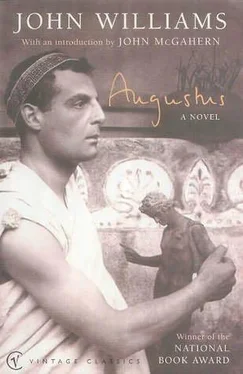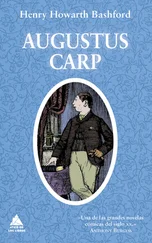John Williams - Augustus
Здесь есть возможность читать онлайн «John Williams - Augustus» весь текст электронной книги совершенно бесплатно (целиком полную версию без сокращений). В некоторых случаях можно слушать аудио, скачать через торрент в формате fb2 и присутствует краткое содержание. Жанр: Историческая проза, на английском языке. Описание произведения, (предисловие) а так же отзывы посетителей доступны на портале библиотеки ЛибКат.
- Название:Augustus
- Автор:
- Жанр:
- Год:неизвестен
- ISBN:нет данных
- Рейтинг книги:3 / 5. Голосов: 1
-
Избранное:Добавить в избранное
- Отзывы:
-
Ваша оценка:
- 60
- 1
- 2
- 3
- 4
- 5
Augustus: краткое содержание, описание и аннотация
Предлагаем к чтению аннотацию, описание, краткое содержание или предисловие (зависит от того, что написал сам автор книги «Augustus»). Если вы не нашли необходимую информацию о книге — напишите в комментариях, мы постараемся отыскать её.
Augustus — читать онлайн бесплатно полную книгу (весь текст) целиком
Ниже представлен текст книги, разбитый по страницам. Система сохранения места последней прочитанной страницы, позволяет с удобством читать онлайн бесплатно книгу «Augustus», без необходимости каждый раз заново искать на чём Вы остановились. Поставьте закладку, и сможете в любой момент перейти на страницу, на которой закончили чтение.
Интервал:
Закладка:
Of all the curses of age, this sleeplessness which increasingly I must endure is the most troublesome. As you know, I have always been subject to insomnias; but when I was younger, I was able to put that nocturnal restlessness of mind to purpose, and I almost enjoyed those moments when it seemed to me that all the world slept and I alone had leisure to observe its repose. Beyond the urgings of those who would advise my policy in the terms of their own vision of the world, which is to say in their visions of themselves, I had the freedom of contemplation and silence; many of my most important policies were determined as I lay awake on my bed in the early hours before dawn. But the sleeplessness that I have recently been undergoing is of a different kind. It is no longer that restiessness of a mind so intent upon its play that it is jealous of that slumber which would rob it of consciousness of itself; it is, rather, a sleeplessness of waiting, a long moment in which the soul prepares itself for a repose unlike any that mind or body has ever known before.
I have not slept this night. Near sunset, we harbored a hundred yards or so offshore in a little cove that protects the few fishing boats of some nameless village, the thatched huts of which are nestled on the slopes of a small hill perhaps half a mile inland. As evening came on, I watched the lamps and the fires glimmer against the dark, and watched until they flickered out. Now, once again, the world is asleep; a number of the crew have taken advantage of the night air, and chosen to sleep on deck; Philippus is below, next to the cabin in which he thinks I rest. Gently, invisibly, the little waves lap against the side of our ship; the night breeze whispers upon our furled sail; the lamp on my table glows fitfully, so that now and then I have to strain my eyes to see these words that I write to you.
During this long night, it has occurred to me that this letter does not serve the purpose for which it was intended. I wished at first, when I began writing to you, merely to thank you for the nicolai, to assure you of my friendship, and perhaps to give us both some comfort in our old age. But in the course ofthat friendly courtesy, I can see that it has become something else. It has become another journey, and one which I did not foresee. I go toward Capri for my holiday; but it seems to me now, in the quietness of this night, beneath the mysterious geometry of the stars, where nothing exists except this hand that forms the curious letters which by some other mysterious process you will understand, it seems to me that I go somewhere else, to a place as mysterious as any I have ever seen. I shall write further tomorrow. Perhaps we can discover that place toward which I travel.
August 10
There was a damp chill in the air when we embarked from Ostia yesterday, and rather foolishly I remained on deck so that I might see the Italian shore recede in the soft mist, and so that I could begin this letter to you-a letter which I intended at first simply to convey my thanks for the nicolai, and to assure you of my continuing affection, despite our long absence from each other. As you shall have understood by now, however, the letter has become more than that; and I beg the indulgence of an old friend to hear out what I shall discover to say. In any event, the chill brought on one of my colds, which has become a fever; and I became once again accustomed to an indisposition. I have not told Philippus of this new illness; I have, rather, reassured him of my well-being; for it appears that I am under some compulsion to complete the task of this letter, and I do not wish to be interrupted by Philippus's solicitudes.
The question of my health has always been less interesting to me than it has been to others. From my youth I have been frail, and subject to such a variety of maladies that more doctors than I like to imagine have been made wealthy. Their wealth has been largely unearned, I suspect; but I do not begrudge them what I have given them. So often has my body led me near death that, in my sixth consulship, when I was thirty-five years old, the Senate decreed that every four years the consuls and the priests of the orders undertake vows and make sacrifices for the state of my health. To fulfill these vows, games were held so that the people might be made to remember their prayers, and all citizens, both individually and by municipalities, were encouraged to perform continued sacrifices for my health at the temples of the gods. It was a foolishness, of course; but it did at least as much for my health as the various medications and treatments that my doctors subjected me to, and it let the people feel that they were participating in the fate of the Empire.
Six times during my life has this tomb of my soul led me to the brink ofthat eternal darkness into which all men sink at last, and six times it has stepped back, as if at the behest of a destiny it could not overmaster. And I have long outlived my friends, in whose lives I existed more fully than in my own. All are dead, those early friends. Julius Caesar died at fifty-eight, nearly twenty years younger than I am now; and I have always believed that his death came as much from that boredom which presages carelessness as from the assassins’ daggers. Salvidienus Rufus died at the age of twenty-three, in his pride and by his own hand, because he thought he had betrayed our friendship. Poor Salvidienus. Of all my early friends, he was most like me. I wonder if he ever knew that the betrayal was my own, that he was the innocent victim of an infection that he caught from me. Vergil died at fifty-one, and I was at his bedside; in his delirium, he thought he died a failure, and made me promise to destroy his great poem on the founding of Rome. And then Marcus Agrippa, at the age of fifty, who had never had a day of illness in his life, died suddenly, at the height of his powers, before I could reach him to bid him farewell. And a few years later-in my memory, the years dissolve into one another, like the notes of tambour and lute and trumpet, to make a single sound-within a month of each other, Maecenas and Horace were dead. Except for you, my dear Nicolaus, they were the last of my old friends.
It seems to me now, as my own life is slowly trickling away, that there was a kind of symmetry in their lives that my own has not had. My friends died at the height of their powers, when they had accomplished their work and yet had further triumphs to look forward to; nor were they so unfortunate to come to believe that their lives had been lived for nothing. For nearly twenty years, it seems to me now, my life has been lived for nothing. Alexander was fortunate to have died so young, else he would have come to know that if to conquer a world is a small thing, to rule it is even less.
As you know, both my admirers and detractors have likened me to that ambitious young Macedonian; it is true that the Roman Empire is now constituted of many of the lands that Alexander first conquered, it is true that like him I came to my power as a young man, and it is true that I have traveled in many of the lands that he first subjugated to his rather barbaric will. But I have never wished to conquer the world, and I have been more nearly ruled than ruler.
The lands that I have added to our Empire, I have added to insure the safety of our frontiers; had Italy been safe without those additions, I should have been content to remain within our ancient borders. As it turned out, I have had to spend more of my life than I would have liked in foreign lands. From the mouth where the Bosporus spills into the Black Sea to the farthest shores of Spain I have traveled, and from the cold wastes of Pannonia where the German barbarians are contained to the burning deserts of Africa. Yet more often than not I did not go as conqueror, but as emissary, in peaceful negotiation with rulers that were more likely to resemble tribal chieftains than heads of state, and who often had neither Latin nor Greek. Unlike my uncle Julius Caesar, who found some odd renewal in such extended travels, I never felt at home in those distant lands, and always longed for the Italian countryside, and even Rome.
Читать дальшеИнтервал:
Закладка:
Похожие книги на «Augustus»
Представляем Вашему вниманию похожие книги на «Augustus» списком для выбора. Мы отобрали схожую по названию и смыслу литературу в надежде предоставить читателям больше вариантов отыскать новые, интересные, ещё непрочитанные произведения.
Обсуждение, отзывы о книге «Augustus» и просто собственные мнения читателей. Оставьте ваши комментарии, напишите, что Вы думаете о произведении, его смысле или главных героях. Укажите что конкретно понравилось, а что нет, и почему Вы так считаете.











